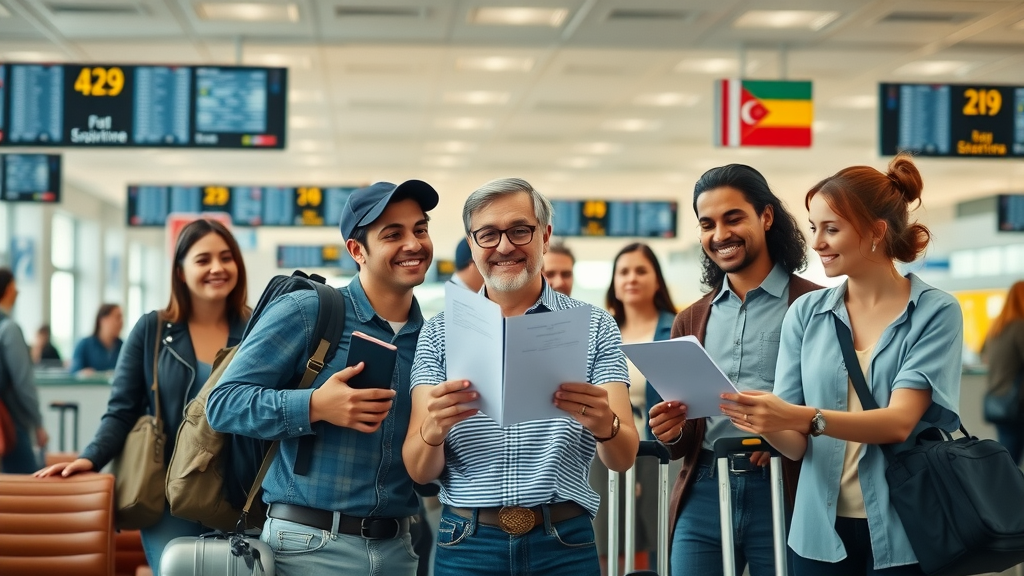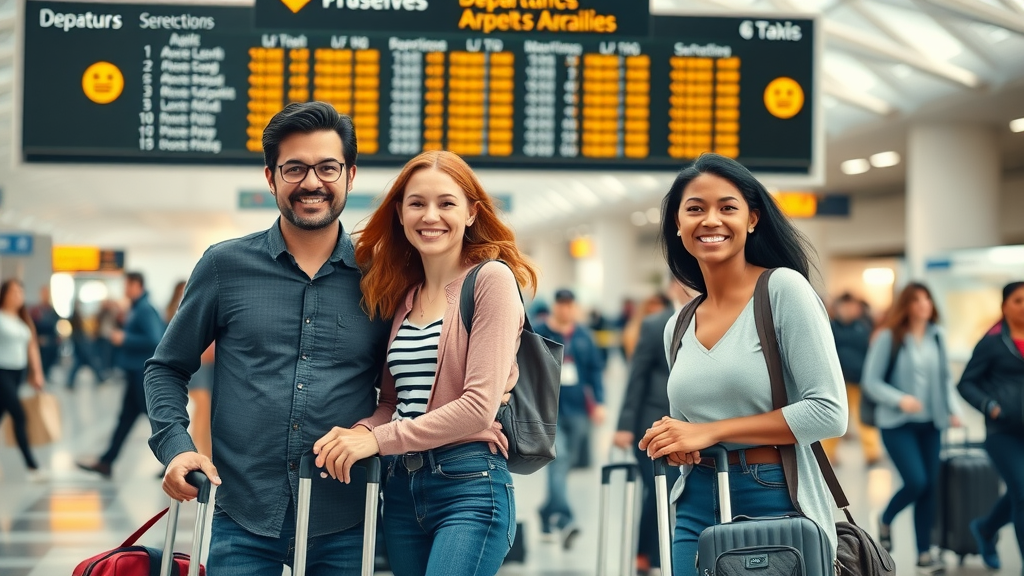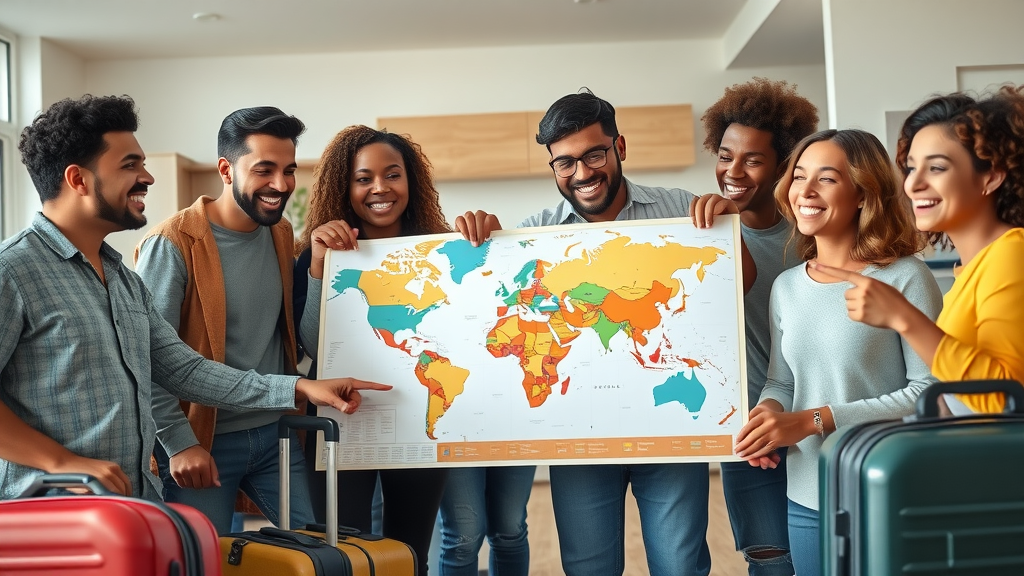Did you know that over nine million Americans are now living abroad, and the number continues to climb each year? Relocating outside USA is no longer just a dream for retirees. It’s a life-changing decision that appeals to young professionals, families, and digital nomads alike. This comprehensive guide will walk you through the vital steps, real-life scenarios, and actionable advice needed to make your transition smooth, legal, and rewarding. Whether you’re considering moving abroad for work, lifestyle, or adventure, read on to discover what you must prepare before you take the leap.
The Global Surge: Why More Americans Are Relocating Outside USA
- A record number of Americans are choosing to move abroad due to better quality of life, job flexibility, affordable healthcare, and adventurous lifestyles.
- International surveys indicate the number of Americans living overseas increased by over 20% in the last decade, with top destinations including Canada, Mexico, Spain, and Portugal.
- The rise of remote work and digital nomad visas is making it easier to live and work abroad or move overseas, but challenges such as legal paperwork, cultural adaptation, and cost of living adjustments still exist.

Essential Checklist for Relocating Outside USA
- Secure all necessary documentation: passport, visa application (including work visa, nomad visa, or tourist visa), birth and marriage certificates.
- Research your destination's legal requirements for permanent residency, temporary work permit, or long-term stays.
- Plan finances: understand bank account options, currency exchange, and tax obligations in both your home country and host country.
- Arrange health insurance that covers international or public health standards in your new country.
- If relocating with family, identify reputable schools, childcare resources, and support networks for easing the integration into local life.
- Prepare for cultural adaptation: learn key phrases of the local language, customs, and basic laws to avoid surprises upon arrival.
Key Insights You’ll Gain About Relocating Outside USA
- The step-by-step practical process for successfully moving abroad—from research through post-arrival.
- In-depth understanding of legal, financial, and personal aspects of life abroad, including work abroad scenarios.
- Proven real-life tips and digital tools to make living and adjusting abroad easier, safer, and more rewarding.
Major Benefits and Challenges of Moving Abroad
Examining the Quality of Life When Relocating Outside USA
- Many expats report an improved quality of life after relocating outside USA, often due to access to universal healthcare, a slower pace of life, or more affordable living costs.
- However, trade-offs can include cultural barriers, bureaucratic red tape, or limited availability of certain products and services that were accessible at home.
- Making the decision to move abroad also challenges individuals to become more adaptable and resilient in a new social and professional environment.

"Relocating outside USA is not just a change of address — it's a transformation in lifestyle and opportunity."
Understanding the Cost of Living When Moving Abroad
| Location | Avg. Rent (USD/mo) | Groceries (USD/mo) | Transport (USD/mo) | Healthcare | Currency |
|---|---|---|---|---|---|
| New York City | $3,100 | $500 | $130 | Private insurance required | USD |
| Lisbon, Portugal | $1,200 | $300 | $50 | Public coverage available | EUR |
| Mexico City, Mexico | $800 | $250 | $32 | Affordable private/public care | MXN |
| Bangkok, Thailand | $700 | $200 | $40 | Private/public hybrid | THB |
- Always consider the rapidly changing cost of living, especially currency exchange rates, housing costs, and differences in food quality and prices when moving abroad.
- Public transportation and healthcare are typically more affordable in many foreign countries compared to the US, but expats are advised to secure health insurance and research out-of-pocket costs for medical access.
Legal Steps: Visas, Work Permits, and Residency for Relocating Outside USA
Securing the right legal status is critical when relocating outside USA—whether for work abroad, long-term stays, or digital nomad lifestyles. Making the move legally ensures you can access local services, open a bank account, and avoid penalties.
Navigating Work Permits and Legal Work Abroad
- Before you work abroad, you typically need a work permit or job offer from an employer in your new country.
- Requirements for a work visa vary widely: some countries require a sponsorship, others offer self-employment or nomad visas for remote workers and freelancers.
- Begin the visa application process early, as approval timelines can be unpredictable and additional documentation—such as proof of funds or background checks—may be needed.
Understanding Residency Options for Living Abroad
- Temporary residency lets you live abroad for a set period (often one year, renewable), while permanent residency provides longer-term status and may lead to citizenship applications.
- Some countries—especially countries in Europe—offer retiree, investment, or digital nomad visas tailored for expats without a traditional job offer.
- Consider the long-term implications for taxes, social security, and your ability to return to the US if you pursue foreign citizenship or change your legal residency status.

Managing Finances: Bank Accounts and Currency When Moving Abroad
Financial preparation is often the most overlooked aspect of moving abroad, yet it’s key to a stress-free start in your new country. Dealing with currency differences, international transaction fees, and staying IRS-compliant are all top concerns for expats making the move abroad.
Opening a Bank Account Before Relocating Outside USA
- Research how to open a local bank account—some countries require proof of address, a residency permit, or a tax ID number before you can open one.
- Set up international transfers to easily move funds between your US and foreign accounts, and always check what fees and limits apply for each type of transaction.
- Don’t forget US tax obligations—US citizens must file annual returns with the IRS regardless of where they live abroad. The Foreign Earned Income Exclusion (FEIE) and foreign tax credits can help you legally save money on double taxation.
Safeguarding Your Finances and Assets Abroad
- Opt for online banks with low international fees, multiple currency accounts, and 24/7 support—some of the best banks for digital nomads include Wise, Revolut, and Charles Schwab.
- Have a plan for keeping investments, property, and retirement accounts in both your home country and new location secure and legal.
- Consult expat-specialized financial advisors to ensure you’re complying with cross-border banking laws, tax treaties, and reporting requirements like FBAR and FATCA.
Career and Work Opportunities Abroad: Making the Leap When Relocating Outside USA
Seeking a new job or forging a remote career overseas is a primary driver for many who move abroad. Understanding the local labor market, finding in-demand roles, and adjusting to a different work culture will determine long-term success when working abroad.
Finding Work Abroad and Remote Employment Options
- There are numerous ways to work abroad: teaching English is a popular entry route, but freelancing, remote digital nomad jobs, healthcare, IT, and hospitality roles are in demand globally.
- Explore company relocation programs, direct job offers, or self-employment in markets receptive to international talent—many countries in Europe, Asia, and Latin America offer specific expat work visa pathways.
- Platforms like LinkedIn, Remote.co, and FlexJobs list international or remote-friendly opportunities to work abroad. Networking locally, even virtually, also boosts your chances of securing employment.
"Digital nomad life offers flexibility — but preparation is key for a sustainable career abroad."
Securing a Work Permit and Adjusting to Working Abroad
- Prepare all required documents for a successful work permit application—typically your contract, skills certifications, proof of qualifications, and background checks.
- Learn about local labor laws and professional etiquette before you move overseas—each country has its own set of rules for time off, contracts, and workplace interactions.
- Cultivate your professional and social network in the host country, join expat forums, or attend local events to adapt quickly to the new work culture and overcome the isolation that sometimes comes with life abroad.

Healthcare & Public Health Considerations When Moving Overseas
- Investigate the local healthcare system—many countries offer affordable or universal coverage, but private insurance may be required for new arrivals or foreigners on short-term visas.
- Understand how public health standards compare with the US and make arrangements for ongoing medication, vaccinations, and medical record transfers before you move abroad.
- Enroll in international health insurance plans designed for expats to protect against unexpected emergencies and ensure access to English-speaking providers whenever possible.

Navigating Relocating Outside USA: Real-Life Experiences From Expats
Family, Education, and Social Adjustment After Relocating Outside USA
- Families relocating outside USA should prioritize researching school options—many top destinations have outstanding international or bilingual schools, as well as supportive expat parenting networks.
- Help children adjust by involving them in extracurriculars and cultural activities early. This accelerates social integration and language acquisition.
- Adults benefit from joining clubs, volunteering, or engaging with other expats, which can make adapting to life abroad less daunting and more fulfilling.
Best Destinations for Relocating Outside USA
- Top countries for US expats include Portugal, Spain, Mexico, Costa Rica, Canada, and New Zealand due to their quality of life, visa flexibility, and welcoming communities.
- Some countries offer “easy move” paths like digital nomad visas or investment residency, making them perfect for remote workers or retirees.
- Family-centric and work-friendly options abound—nations such as Germany, Australia, and Singapore are favored for excellent education systems and career prospects.
| Country | Visa Ease | Quality of Life | Job Opportunities | Safety |
|---|---|---|---|---|
| Portugal | High | Excellent | Growing Tech/Remote | Very Safe |
| Mexico | High | Great | Diverse/Remote | Good (Urban caution) |
| Spain | High | Excellent | English Teaching | Very Safe |
| New Zealand | Moderate | Excellent | In-Demand Professions | Very Safe |
| Thailand | High | Great | Tech, Tourism | Good |

Checklist for Digital Nomads Thinking of Relocating Outside USA
- Apply for a digital nomad visa or long-term tourist/entrepreneur work visa in countries optimized for remote work, such as Portugal, Estonia, and Costa Rica.
- Ensure your chosen destination has reliable internet, well-rated co-working spaces, and an active digital nomad or expat network.
- Plan for international health coverage, keep up with local legal requirements for living abroad, and choose a bank with easy currency conversion and low transaction fees.
People Also Ask: Relocating Outside USA Questions Answered
What is the easiest country to relocate to from the US?
- Popular easy-to-move options for Americans include Mexico and Portugal due to simple visa application processes, low barriers for temporary or permanent residency, and solid quality of life rankings.
- Costa Rica and Panama also offer retirement visas and affordable living, making the process of living abroad straightforward for US expats.
How to legally move out of the USA?
- Start by researching your destination’s legal entry and residency requirements, and gather necessary documents (passport, birth certificate, financial proof, medical records).
- Apply for the relevant work visa, student visa, or residency permit ahead of your move—well in advance since many processes take weeks or months.
Can a US citizen just move to another country?
- While you can travel to many countries visa-free as a tourist, living abroad longer-term requires a valid visa or residency permit—often based on work, study, retirement, or investment.
- Always check legal requirements for work permits, length of stay, and plan accordingly to stay compliant when you move abroad.
What is the safest country to move to from the US?
- Countries like Portugal, New Zealand, and Japan consistently rank as some of the safest for expats, offering high public safety, reliable public health infrastructure, and robust expat support networks after relocating outside USA.
- Consider local crime rates, healthcare access, and existing American communities in your destination country when choosing where to move.
Key Steps for a Smooth Relocating Outside USA Experience
- Research your destination thoroughly.
- Secure all legal documentation: passport, visa, work permit, or residency.
- Prepare finances—set up a local and/or international bank account, plan for taxes, and save money for emergencies.
- Arrange adequate health insurance coverage.
- Book long-term accommodation and make an arrival checklist.
- Develop a support network by connecting with expats, locals, and professional groups for a better life abroad.
Top FAQs for Moving Abroad and Relocating Outside USA
- Can I bring my pet when relocating outside USA? Yes, but you must comply with your destination’s import regulations, vaccinations, and quarantine rules. Start research early to avoid last-minute surprises.
- What about shipping my vehicle? Many countries allow vehicle importation but often require modifications, taxes, or fees; weigh costs against buying locally after you move abroad.
- Can I continue remote work with a US employer while abroad? Generally yes, but review your work visa and tax obligations before committing to working abroad remotely.
- What are my tax responsibilities? US citizens must file an annual US tax return on worldwide income, even after relocating, and may need to report foreign bank account balances.
- How do I maintain a mailing address? Set up a virtual mailbox or ask a trusted family member to receive and forward critical mail during your time abroad.
Expert Tips & Insights: Succeeding When Moving Abroad
- Connect with relocation specialists or international communities before you arrive for local advice and insider tips on the move abroad process.
- Plan for the unexpected by keeping emergency savings and copies of important documents both digitally and physically.
- Be flexible and open-minded: every country has its quirks and rhythms—adapting quickly will help you thrive in your new life abroad.
- For digital nomads, stable Wi-Fi and solid work-life boundaries are essential for striking a sustainable balance after relocating outside USA.
- Prioritize learning the local language, even just basic phrases, to integrate better and enjoy deeper connections in your host country.
"Prepare well, adapt flexibly, and embrace the new — relocating outside USA offers opportunities for growth and adventure."
Final Thoughts on Relocating Outside USA for a New Life Abroad
- Action Steps: Start your research, build your checklist, and take decisive first steps to prepare for your overseas journey. The world is ready for you—make your dream of relocating outside USA a reality today!
Relocating outside the USA is a significant decision that requires thorough preparation. To assist you in this journey, here are some valuable resources:
-
“Checklist For Moving Outside The U.S.” by HSBC Bank USA provides a comprehensive list of essential tasks to complete before your move, including passport validity, visa applications, health checks, and financial arrangements. (us.hsbc.com)
-
“US Expat Guide to Moving Abroad: 2025 Edition” by Greenback Expat Tax Services offers insights into visa requirements, tax obligations, and other critical considerations for U.S. citizens planning to live overseas. (greenbacktaxservices.com)
These resources will equip you with the necessary information to ensure a smooth and well-informed transition to your new home abroad.
 Add Row
Add Row  Add
Add 




Write A Comment